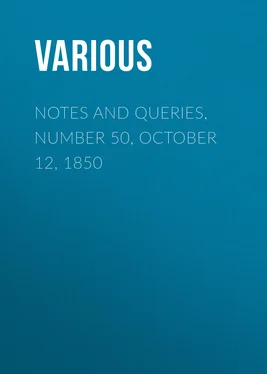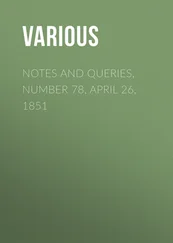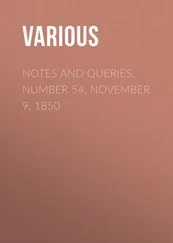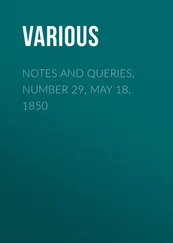Various - Notes and Queries, Number 50, October 12, 1850
Здесь есть возможность читать онлайн «Various - Notes and Queries, Number 50, October 12, 1850» — ознакомительный отрывок электронной книги совершенно бесплатно, а после прочтения отрывка купить полную версию. В некоторых случаях можно слушать аудио, скачать через торрент в формате fb2 и присутствует краткое содержание. Жанр: foreign_antique, periodic, foreign_edu, на английском языке. Описание произведения, (предисловие) а так же отзывы посетителей доступны на портале библиотеки ЛибКат.
- Название:Notes and Queries, Number 50, October 12, 1850
- Автор:
- Жанр:
- Год:неизвестен
- ISBN:нет данных
- Рейтинг книги:5 / 5. Голосов: 1
-
Избранное:Добавить в избранное
- Отзывы:
-
Ваша оценка:
- 100
- 1
- 2
- 3
- 4
- 5
Notes and Queries, Number 50, October 12, 1850: краткое содержание, описание и аннотация
Предлагаем к чтению аннотацию, описание, краткое содержание или предисловие (зависит от того, что написал сам автор книги «Notes and Queries, Number 50, October 12, 1850»). Если вы не нашли необходимую информацию о книге — напишите в комментариях, мы постараемся отыскать её.
Notes and Queries, Number 50, October 12, 1850 — читать онлайн ознакомительный отрывок
Ниже представлен текст книги, разбитый по страницам. Система сохранения места последней прочитанной страницы, позволяет с удобством читать онлайн бесплатно книгу «Notes and Queries, Number 50, October 12, 1850», без необходимости каждый раз заново искать на чём Вы остановились. Поставьте закладку, и сможете в любой момент перейти на страницу, на которой закончили чтение.
Интервал:
Закладка:
Various
Notes and Queries, Number 50, October 12, 1850
NOTES
A NOTE ON "SMALL WORDS."
"And ten small words creep on in one dull line."
Most ingenious! most felicitous! but let no man despise little words, despite of the little man of Twickenham. He himself knew better, but there was no resisting the temptation of such a line as that. Small words he says, in plain prosaic criticism, are generally "stiff and languishing, but they may be beautiful to express melancholy."
The English language is a language of small words. It is, says Swift, "overstocked with monosyllables." It cuts down all its words to the shortest possible dimensions: a sort of half-Procrustes, which lops but never stretches. In one of the most magnificent passages in Holy Writ, that, namely, which describes the death of Sisera:—
"At her feet he bowed, he fell: at her feet he bowed, he fell, he lay down: where he bowed, there he fell down dead."
There are twenty-two monosyllables to three of greater length, or rather to the same dissyllable thrice repeated; and that too in common parlance proncounced as a monosyllable. The passage in the Book of Ezekiel, which Coleride is said to have considered the most sublime in the whole Bible,—
"And He said unto me, son of man, can these bones live? And I answered, O Lord God, though knowest,"—
contains seventeen monosyllables to three others. And in the most grand passage which commences the Gospel of St. John, from the first to the fourteenth verses, inclusive, there are polysyllables twenty-eight, monosyllables two hundred and one. This it may be said is poetry, but not verse, and therefore makes but little against the critic. Well then, out of his own mouth shall he be confuted. In the fourth epistle of his Essay on Man , a specimen selected purely at random from his works, and extending altogether to three hundred and ninety-eight lines, there are no less than twenty-seven (that is, a trifle more than one out of every fifteen,) made up entirely of monosyllables: and over and above these, there are one hundred and fifteen which have in them only one word of greater length; and yet there are few dull creepers among the lines of Pope.
The early writers, the "pure wells of English undefiled," are full of "small words."
Hall, in one of the most exquisite of his satires, speaking of the vanity of "adding house to house, and field to field," has these most beautiful lines,—
"Fond fool! six feet shall serve for all thy store,
And he that cares for most shall find no more!"
"What harmonious monosyllables!" says Mr. Gifford; and what critic will refuse to echo his exclamation? The same writer is full of monosyllabic lines, and he is among the most energetic of satirists. By the way, it is not a little curious, that in George Webster's White Devil, or Vittoria Corombona , almost the same thought is also clothed in two monosyllabic lines:—
"His wealth is summed, and this is all his store:
This poor men get, and great men get no more."
Was Young dull? Listen, for it is indeed a "solemn sound:"—
"The bell strikes one. We take no note of time
Save by its loss, to give it then a tongue
Was wise in man."
Was Milton tame? Hear the "lost archangel" calling upon Hell to receive its new possessor:—
"One who brings
A mind not to be chang'd by place or time.
The mind is its own place, and in itself
Can make a heav'n of hell,—a hell of heav'n.
What matter where, if I be still the same,
And what I should be; all but less than he
Whom thunder hath made greater ? Here at least
We shall be free; the Almighty hath not built
Here for his envy ; will not drive us hence:
Here we may reign secure ; and in my choice
To reign is worth ambition , though in hell:
Better to reign in hell, than serve in heav'n!"
A great conjunction of little words! Are monosyllables passionless? Listen to the widowed Constance:—
"Thou mayst, thou shalt! I will not go with thee!
I will instruct my sorrows to be proud;
For grief is proud, and makes his owner stout;
To me, and to the state of my great grief,
Let kings assemble ; for my grief's so great,
That no supporter but the huge firm earth
Can hold it up: here I and sorrow sit;
Here is my throne: bid kings come bow to it."
Six polysyllables only in eight lines!
The ingenuity of Pope's line is great, but the criticism false. We applaud it only because we have never taken the trouble to think about the matter, and take it for granted that all monosyllabic lines must "creep" like that which he puts forward as a specimen. The very frequency of monosyllables in the compositions of our language is one grand cause of that frequency passing uncommented upon by the general reader. The investigation prompted by the criticism will serve only to show its unsoundness.
K.I.P.B.T.ON GRAY'S ELEGY
If required to name the most popular English poem of the last century, I should perhaps fix on the Elegy of Gray. According to Mason, it "ran through eleven editions in a very short space of time." If he means separate editions, I can point out six other impressions in the life-time of the poet, besides those in miscellaneous collections viz. In Six Poems by Mr. T. Gray , London, 1753. Folio—1765. Folio—and in Poems by Mr. Gray , London, 1768. small 8o.—Glasgow 1768. 4o.—London. A new edition, 1768. small 8o. A new edition, 1770. small 8o. So much has been said of translations and imitations, that I shall confine myself to the text.
Of the first separate edition I am so fortunate as to possess a copy. It is thus entitled:—
" An elegy wrote in a country church-yard . LONDON: printed for R. Dodsley in Pal-mall; and sold by M. Cooper in Pater-noster-row, 1751. Price six-pense. 4o six leaves.
"Advertisement.
"The following POEM came into my hands by accident, if the general approbation with which this little piece has been spread, may be call'd by so slight a term as accident. It is this approbation which makes it unnecessary for me to make any apology but to the author: as he cannot but feel some satisfaction in having pleas'd so many readers already, I flatter myself he will forgive my communicating that pleasure to many more.
"The EDITOR."
The history of this publication is given by Gray himself, in a letter to Walpole, dated in 1751, and needs no repetition; but I must observe, as a remarkable circumstance, that the poem was reprinted anonymously , in its separate form, as late as 1763.
I have collated the editions of 1751 and 1770, and find variations in stanzas 1, 3, 5, 9, 10, 12, 23, 24, and 27. All the amendments, however, were adopted as early as 1753, except the correction of a grammatical peccadillo in the ninth stanza.
I make this communication in the shape of a note, as it may interest men of the world not less than certain hermits .
BOLTON CORNEY.GRAY'S ELEGY IN PORTUGUESE
In several numbers of the "NOTES AND QUERIES" mention is made of various translations into foreign languages of GRAY'S Elegy in a Country Church-yard . P.C.S.S. begs leave to add to the list a very elegant translation into Portuguese, by the Chevalier Antonio de Aracejo (afterwards Minister of Foreign Affairs at Lisbon and at Rio de Janeiro), to whose friendship he was indebted many years ago for a copy of it. It was privately printed at Lisbon towards the close of the last century, and was subsequently reprinted at Paris in 1802, in a work called Traductions interlinéaires, en six Langues , by A.M.H. Boulard.
Читать дальшеИнтервал:
Закладка:
Похожие книги на «Notes and Queries, Number 50, October 12, 1850»
Представляем Вашему вниманию похожие книги на «Notes and Queries, Number 50, October 12, 1850» списком для выбора. Мы отобрали схожую по названию и смыслу литературу в надежде предоставить читателям больше вариантов отыскать новые, интересные, ещё непрочитанные произведения.
Обсуждение, отзывы о книге «Notes and Queries, Number 50, October 12, 1850» и просто собственные мнения читателей. Оставьте ваши комментарии, напишите, что Вы думаете о произведении, его смысле или главных героях. Укажите что конкретно понравилось, а что нет, и почему Вы так считаете.












